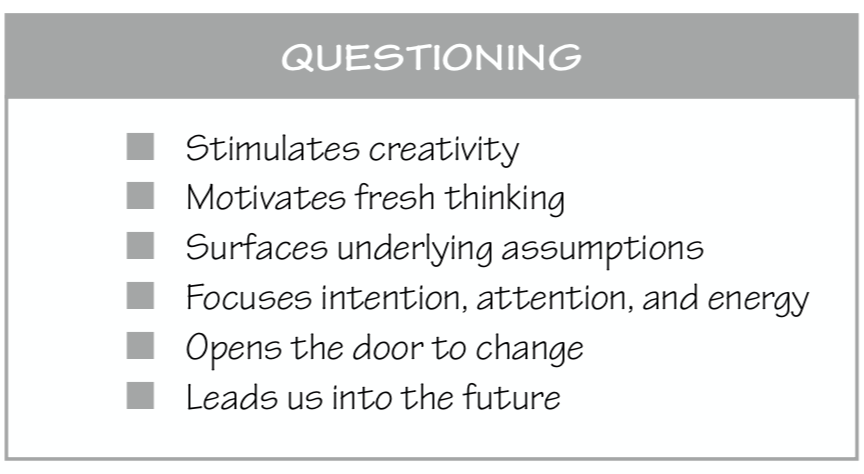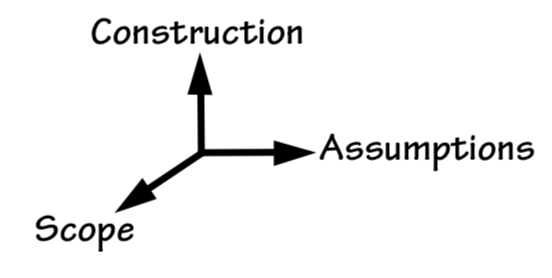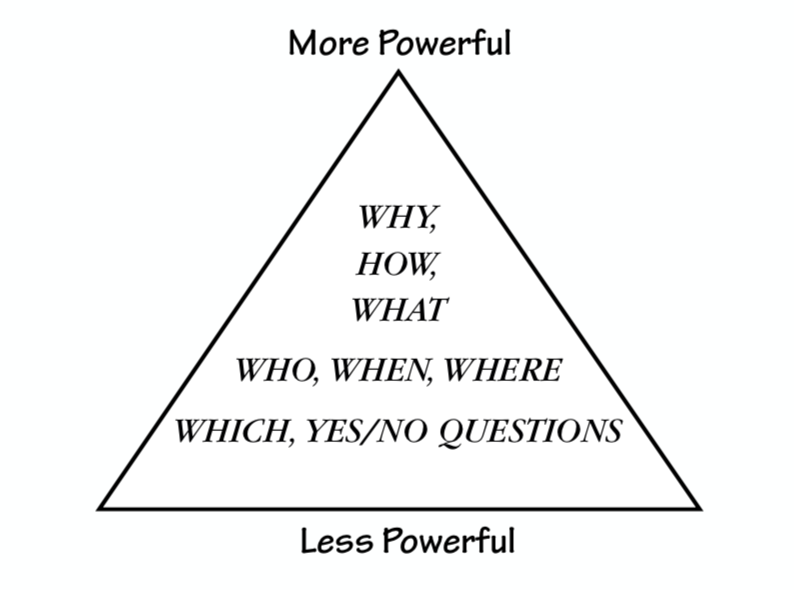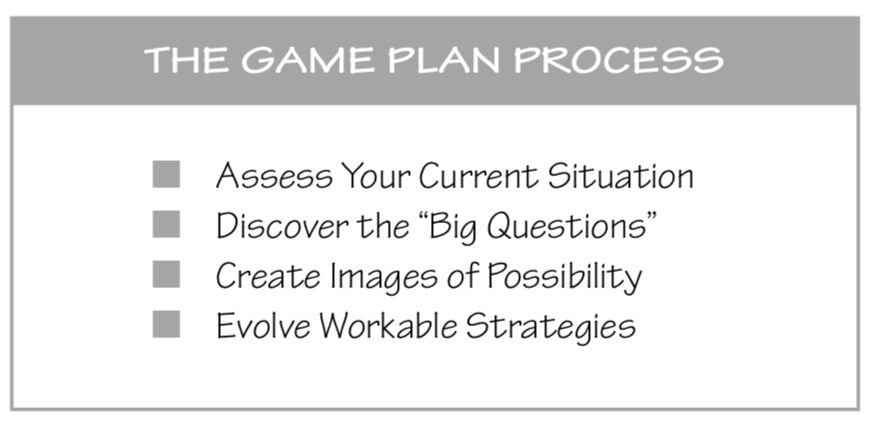By Eric E. Vogt, Juanita Brown, and David Isaacs.
What if the most important thing for managers and leaders would be to ask the right questions instead of just fixing problems?
You can find the complete article by clicking here.
Why it is important to ask continually Powerful Questions?
Powerful questions are the key to improve the quality of insight, innovation, and action in our organizations, in our communities, and in our lives.

“The problems we have cannot be solved at the same level of thinking that created them.”
Albert Einstein

Why don’t we ask better Questions?
In our culture, we are uncomfortable to look for the right questions without a direct answer. We prefer to look for the right answers, quick fixes and easy solutions. Our education system
This is also reinforced by our rewards system: leaders and managers are rewarded when fixing problems. So they think they are paid for fixing problems rather than questioning.
But it is only by asking the good questions that we can create truly innovative solutions.
What Makes a Question Powerful?
A powerful Question must:
- Generates curiosity in the listener
- Stimulates reflective conversation
- Is thought-provoking
- Surfaces underlying assumptions
- Invites creativity and new possibilities
- Generates energy and forward movement
- Channels attention and focuses inquiry
- Stays with participants
- Touches a deep meaning
- Evokes more questions
- Travel well -> Key to Large scale change
Structure of Powerful Questions
There are 3 dimensions in the structure of a Powerful Question.

Construction
Let’s start with the Construction. Construction can make a critical difference by opening our mind or limiting the possibilities we can consider (ex: YES/NO questions). So here you can find the interrogative words classified from lower to higher power.

We must take into account the fact that a WHY question, if not well constructed, can push the person in a defensive posture. So we must be careful to well craft them.
Scope
When structuring our questions we should well choose the scope. Considering the question “How can we best manage” the scope can vary:
- How can we best manage our workgroup?
- How can we best manage our company?
- How can we best manage our supply chain?
- How can we best manage the economy?
Assumptions
To formulate powerful questions, it’s important to become aware of assumptions and use them appropriately. So, contrast the question:
- “What did we do wrong and who is responsible?”
- “What can we learn from what’s happened and what possibilities do we now see?”
OR
- How can we compete with the Chinese?
- How can we collaborate with the Chinese?
Before a meeting or if you have a problem to solve, write down a list of questions and rate them to find the more powerful ones. Change the construction, the Scope and the Assumptions to make it more powerful.
Using Powerful Questions in Organizations
HP case study:
Question v1: The director of HP Labs wondered why the organization was not considered the best industrial research laboratory in the world?
became:
Question v2: What does being the best industrial research lab in the world mean?
became:
Question v3: What would really energize me and get me up in the morning would be asking, “How can we be the best industrial research lab for the world?”
You can do the same in your Organization by enhancing strategic thinking and structuring Powerful Questions. One example could be:
- How can we create a community at work that enables each person to contribute our best, inspires us to keep learning, and produces valued results?
The Game Plan Process

Assess your Current Situation
Scan your internal and external context. Analyse the situation and frame your findings as questions:
- How does A affect C
- What questions does that suggest?
- If X were at play here, what question would we be asking?
- What’s the real question underneath all this data?
Discover the “Big Questions”
- Find the common pattern and theme. Find the most relevant among the ones you already found. Reframe.
Create Images of possibility
- Ask yourself, “What would our situation look like or be like if the ‘big questions’ were answered?”
Evolve Workable Strategies
- Now that you have your Big Questions and you imagined all possibility you can think about your actions plan.
Congratulation you are now passed from a “fix-it” mode to a “questions that matter” mode. This is essential for the evolution of the company strategy.
How Can Leaders Engage Powerful Questions?
Nowadays it is critical for leaders to ask strategic questions in order to learn, adapt, create new knowledge to meet emerging opportunities, as they are the key to success.
Leaders today are more familiar with solving problems rather than framing strategic questions that will open their mind to new possibilities. It is important for them learning to ask themselves the rights questions and engaging their workers to discover them too.
Leaders also need to consider reward systems that provide incentives for members to work across organizational boundaries.
They must become connector of people and ideas. They should nurture learning networks and collaboration with all the workers.
Leaders mindset should shift from focusing primarily on what is not working and how to fix it, to also discovering and appreciating what is working and how to leverage it.
Hosting Learning Conversations
In order to have a good climate that improves learning conversations, you should:
- Create a climate of discovery
- Suspend premature judgment
- Explore underlying assumptions and beliefs
- Listen for connections between ideas
- Encourage diverse perspectives
- Honour everyone’s contributions
- Articulate shared understanding
- Harvest and share collective discoveries
It is also important to create a learning network where everyone can share and discuss about new possibilities.
